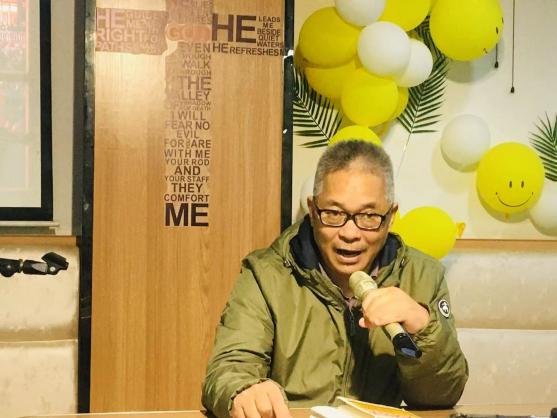A famous Christian psychologist urged people to rediscover the culture of awe as people are not created to be tools.
On April 28, 2022, the lecture entitled "Facing Life Under the Pandemic (From Existential Psychology Perspective)” was held through WeChat live streaming on the “Group Psychotherapist Development Themes Online Forum”.
Xuefu Wang, the sharing guest, is the director of Nanjing Zhimian Institute of Counseling and Psychotherapy, Doctor of Literature at Nanjing University, Master of Psychology and Counseling at Andover Newton Theological School, and Ph.D. student in Existential-Humanistic Psychology at Saybrook University. He is also the author of the books The Road to Growth, The Wounded, and The Healing Heart".
Mr. Wang introduced Western existential psychotherapy to the Chinese public and devoted himself to professional practice and theoretical research of existential psychotherapy in the the context of Chinese culture, being honored as "the first person of existential psychotherapy in China" by the psychotherapy industry. For more than ten years, Wang has been immersed in professional practice and theoretical and cultural research of psychotherapy in Chinese society and has accumulated rich experience in the treatment of obsessive-compulsive disorder, anxiety, depression, etc. He is also engaged in marriage and family counseling. With his practical experience, he has created a Chinese indigenous psychological method called "Zhi Mian Approach".
Professor Wang answered questions about “whether matter determines consciousness or consciousness determines matter”, “the difference between materialism and idealism”, “how to distinguish interpersonal loneliness, existential loneliness, and inner loneliness”, etc.
In the sharing session, Professor Wang said, "Nanjing, the city I live, is a traumatized city. When we talk about existentialism, we think of trauma. Trauma itself reflects the human existence."
On the topic of materialism and idealism, he shared how we should see Albert Einstein — is he a materialist or an idealist? Professor Wang answered that in the scientific field, Einstein is a materialist, but his views on the spiritual nature of the universe have the elements of philosophy and theology which are no longer a materialistic perspective but psychological and spiritual elaboration. The same for Newton. He was known as a scientist, and many of us have learned about his science. Newton extended his study into theology, and many people feel it’s a waste which may not be the case. We need to break the duality idea of either materialism or idealism because it’s possible for one person to hold both views.
Answering which the priority regarding essence and existence is, the psychologist said, "What is the essence of existence? When we say that existence precedes essence, we often find it a bit puzzling, but we are actually talking about human subjectivity, human freedom, human choice, and the difference between people and things. For a table, its essence precedes existence. Before we make a table, we first define the essence of the table and then make it. But when Sartre talked about existence, he referred to the existence of human beings. Only existence can reflect on its own existence and only then it can explain its existence. We can ask ourselves the ultimate questions of who I am, why I live, and where I am going.”
He added, "Existential theology emphasizes the freedom of both objectivity and subjectivity. Cafe tables are defined, but cafe waiters are not. Human beings will ask about the meaning of existence, and they will reflect on their finitude, death, education, freedom, and other topics. Existence is the premise for human beings to ask questions about existence."
An audience asked, "What do you think about loneliness? How to distinguish interpersonal loneliness, existential loneliness, and psychological loneliness?"
Professor Wang replied: "Loneliness, emotion, meaning and suffering are all very core topics in existential psychology. Existing in this world as a human being, We are inherently lonely. Even someone who is very close to you still cannot go to the place where you feel the most lonely and painful. Understanding between human beings cannot reach their deepest loneliness.”
"Even the most famous therapist can't feel the other people’s trauma. For interpersonal loneliness, we need love, care, companionship, and support. Loneliness within the heart is related to the satisfaction of people's sense of value. Existential loneliness is a kind of vacancy inside, not the lack of value, emotion, and material. When people can't feel the meaning of life, they fall into the existential emptiness."
Ugring to rediscover the culture of awe, Professor Wang said, "We live in the lacking awe era. When people do not have the feeling of awe, they think the disappearance of a city or the extinction of species has nothing to do with them. But in the end, these issues are relevant to everyone. The consequence of our deeds will come back to us. For example, the pandemic has brought profound changes to our world and our lives.”
"The psychology of awe is psychology based on awe. Humans are losing true awe in the process of cultural development. Nowadays, people worship technology and success excessively and lose the heart of awe. People themselves are not tools but divine beings worth reverence. A person is good when he respects human nature and is not good when he tramples on human nature and treats people as tools. Are children tools for parents? Are our children study machines? When parents demand good grades only from their children, they ignore children’s humanity. When people emphasize things they do only, they cannot feel their existence.”
- Translated by Katherine Guo











